It’s easy to feel lost and worried when you hear words like “recession” thrown around. I remember a few years ago, my neighbor lost his job unexpectedly. He was a kind, hardworking man, and seeing him struggle – the worry in his eyes, the uncertainty about the future – really shook me. It made me realize how quickly things can change and how important it is to understand what’s happening around us, even when it feels overwhelming.
That’s why I put together this list of books. It's not about becoming an economist or memorizing complex formulas. It's about gaining a better understanding of what a recession is, how it happens, and what it means for all of us. These books break down complicated ideas in ways that are accessible and relatable. My hope is that, by reading them, you’re able to feel a little less anxious, a little more informed, and maybe even a little more empowered to navigate these challenging times.
Crashed: How a Decade of Financial Crises Changed the World
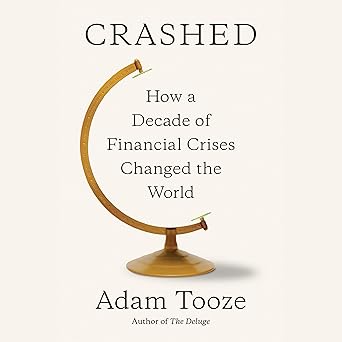
The 2008 economic crisis was a pivotal moment in world history, one that has had a lasting impact on global governance, trade, and economic policies. At its core, the crisis was a complex web of financial decisions, regulatory failures, and global interconnectedness that eventually led to a dramatic collapse of the financial system. As I reflect on the experiences of many, I am reminded of the fragility of our economic systems and the importance of understanding the intricate relationships between nations and institutions. The story of the crisis is one of interconnectedness, where events in one country or region have far-reaching consequences for others. The crisis was initially contained to the US, but it quickly spread to Europe, Asia, and beyond, causing widespread devastation and reshaping the global economic order. What happened on Wall Street was not an isolated incident, but a symptom of a deeper crisis that required a global response. As we navigate the complexities of today's economic policies, it is crucial to understand the roots of the crisis and how they have shaped our world. With a historian's keen eye for detail, Adam Tooze provides a compelling narrative of the crisis and its aftermath, shedding light on the key players, events, and decisions that led to the crisis and its ongoing impact.
Discover this book on Amazon (affiliate link)
The Return of Depression Economics and the Crisis of 2008
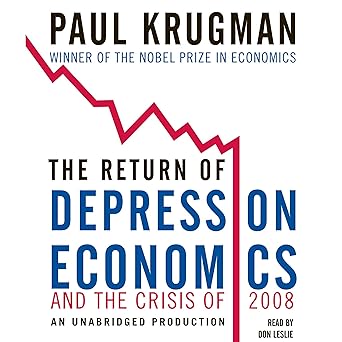
I recently had the opportunity to dive into a book that I believe is essential reading for anyone looking to understand the current economic landscape. The author's masterful narrative takes us on a journey through the decades, from the early warning signs of economic crises in Asia and Latin America in the 1990s, to the devastating consequences of the 2008 financial crisis that hit the United States. What struck me most about this book was the author's ability to convey the sense of urgency and foreboding that accompanied the return of depression economics. The story is not just about economic theory, but also about the human impact of economic policy - the struggles of ordinary people who lost their jobs, homes, and savings in the wake of the crisis. As I turned the pages, I couldn't help but think of my friends and family members who were directly affected by the crisis, and the feelings of helplessness and frustration that many of us felt as we watched our world around us unravel. The author's passion and expertise shine through on every page, making this book a compelling and accessible read for anyone looking to make sense of the current economic chaos.
Discover this book on Amazon (affiliate link)
How Markets Fail
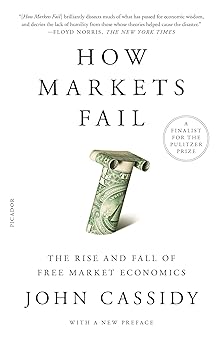
This book is a thought-provoking exploration of the limitations of economic thinking and its consequences for society. I'll never forget the time I visited a small town in rural America that was struggling to recover from a devastating economic downturn. The town's residents were desperate for a way out, and it was clear that the traditional economic theories that had been applied to their situation had failed them miserably. As I spoke with the townspeople, I realized that the problems they faced were not unique to their community, but were instead symptoms of a broader issue - the ideology of unregulated markets. The author, John Cassidy, delves into this idea, explaining how for decades, economists have been developing theories that prioritize innovation, wealth creation, and resource allocation. However, when markets fail, these theories can lead to devastating consequences, such as stock market bubbles, income inequality, and environmental degradation. Cassidy's work is not just a critique of economic thinking, but also a call to action, urging readers to consider alternative approaches that take into account the complexities of human behavior and the need for regulation. Through his clear explanations and on-the-ground reporting, Cassidy sheds light on a pressing issue that remains relevant today, as the world grapples with the consequences of economic crises.
Discover this book on Amazon (affiliate link)
Financial Crises : Causes, Consequences, and Policy Responses
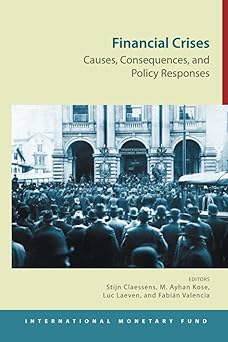
This book provides a comprehensive overview of research into financial crises and policy lessons learned. The author starts by explaining the different types of financial crises that can occur, such as banking, balance of payments, and sovereign debt crises. The book then delves into the short-term economic effects of these crises, as well as the long-term effects on economic growth. The author discusses the ways in which policymakers can prevent and manage crises, and the policies that can be implemented to mitigate their impact. One of the most important aspects of the book is the database of financial crises that is included, which provides a unique resource for researchers and policymakers. The author also explores the ways in which countries can restructure their economies after a financial crisis, and the importance of monitoring economic activity. Throughout the book, the author emphasizes the need for policymakers to be proactive in preventing and managing financial crises, and provides valuable lessons on how countries can work together to achieve this goal. The book's comprehensive approach makes it a valuable resource for anyone looking to understand the causes, consequences, and policy responses to financial crises.
Discover this book on Amazon (affiliate link)
Economic Crisis, International Tourism Decline And Its Impact On The Poor
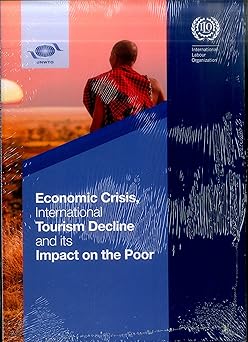
The 2009 global economic crisis had a profound impact on international tourism, leading to a significant decline in international tourist arrivals and revenues. As I reflect on the complexities of this issue, I am reminded of the countless families who have been severely affected by the loss of livelihoods caused by the decline in tourism. The report sheds light on the far-reaching consequences of this crisis, revealing how it has disproportionately affected the poor and vulnerable groups. The decline in international tourism demand has resulted in substantial losses for households, making it increasingly difficult for them to cope with the shocks. The authors of this report have provided a valuable analysis of the macro-economic effects of this crisis, and also presented case studies from the Maldives, Costa Rica and Tanzania, which highlight the specific challenges faced by these countries. The study's findings underscore the need for policymakers to consider the impact of economic crises on the most vulnerable segments of society, and to develop strategies that prioritize their needs and well-being.
Discover this book on Amazon (affiliate link)